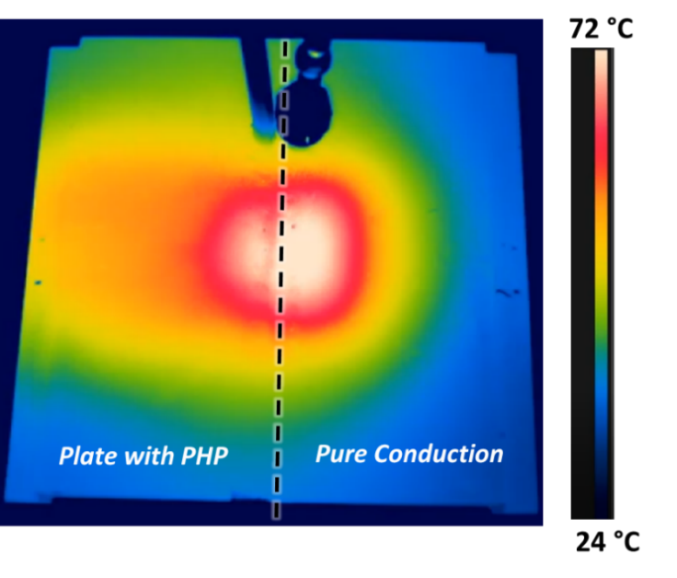NASA SBIR Phase II Award-Space Modular Electronics Cooling
Advanced Cooling Technologies, Inc. (ACT) announced today the funding of a NASA SBIR Phase II program to develop and mature the cooling technologies used in the Modular Electronics Units (MEUs) used in spacecraft. These MEUs will enable future space power systems and exploration missions. Under this program, ACT will explore multiple advanced thermal management technologies that will mitigate electronic component hot spots, enabling higher power density electronics to operate in space conditions. The proposed cooling system for MEUs consists of the following key components:
- Pulsating Heat Pipe (PHP) heat spreaders: a passive heat-spreading device using oscillation of a two-phase working fluid within a capillary serpentine channel to deliver heat from the card center to the edges (as demonstrated in Figure 1). The thermal conductance of a PHP is generally 8-10 times higher than a conventional aluminum plate.

ACT has been developing PHPs under many internal R&D, commercial, and government-funded programs; this NASA SBIR Phase II will enable ACT to apply the PHP research to space applications.
- Isothermal Card Edge Wedge locks (ICE-LoksTM): wedge locks that provide an enhanced thermal interface between the conduction card and the chassis rails.
ACT’s ICE-Lok™ wedge lock design has an additional patented conduction pathway (as compared to the state-of-the-art wedge lock competitors) to improve heat transfer through the card-chassis interface.
- Chassis with Embedded Cooling: will also passively and effectively transfer heat from the chassis rails to the ultimate heat sink on a spacecraft.
In addition to PHPs, another heat-spreading technology that will be further developed in this program includes ACT’s HiK™ Plates (heat-pipe-embedded, high conductivity plates). Their thermal performance evaluations will be based on both high and low heat-flux conditions while considering known space and vacuum conditions. ACT will also develop an advanced enclosure with embedded cooling to minimize the overall thermal resistance of the system from the conduction cards to the ultimate heat sink on a spacecraft.
The development of this technology and standardization will allow engineers flexibility within systems. It will also provide the cost benefits of utilizing a standard, decreased downtime by maintaining temperatures below the maximum for operation; this will prevent high-power electronics systems from overheating when operating for long durations. According to Dr. Kuan-Lin Lee, the Principal Investigator for this project, the proposed technologies have a wide range of applications, including embedded cooling 3U boards, Space VPX systems, and electric propulsion systems. Many space missions/systems will directly benefit from this research, including the Gateway-Artemis, lunar and Martian habitats, solar-electric propulsion, electrified aircraft propulsion, CubeSat thermal management, and future International Space Station (ISS)-type missions (e.g., orbiting habitats).
Visit the Spacecraft Thermal Control page for more information
